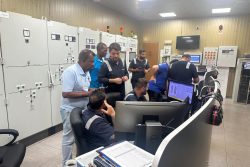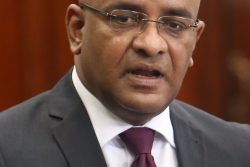Government has updated its local content plan guideline for companies that want to operate here; requiring those who submit from next year to state how they will utilise women and small and medium sized businesses, among other projections.
The guideline was updated to include definitions for women-owned and small businesses. The updated guideline, published on the Ministry of Natural Resources website, said that “women-owned” refers to businesses “in which at least 51 percent ownership/stake is held by a woman/women.”
It also includes, “The requirement to stipulate how the contractor or sub-contractor intends to promote the utilisation of small and medium-sized enterprises …”
The Local Content Act, which was passed last year, provides for the implementation of local content obligations on companies and persons engaged in petroleum operations or related activities in the petroleum sector and prioritises Guyanese nationals and companies in the procurement of goods and services for the enhancement of the value chain of the sector.
The Act also serves to enable local capacity development and provide for the investigation, supervision, coordination, monitoring, and evaluation of, and participation in, local content here.
Section 10(1) of the Act obligates contractors, sub-contractors, or licensees existing immediately before the coming into operation of the Act to submit a Local Content Annual Plan to the minister for approval within 60 days after the coming into operation of the Act.
Section 10(5) of the Act obligates contractors, sub-contractors or licensees to submit a Local Content Annual Plan to the minister for approval “within 60 days prior to, but no later than 30 days after, the beginning of each calendar year, …, on or before the 30th day of January annually.”
The guideline prepared by the Local Content Secretariat is issued in accordance with the Act, which provides for it to develop formats for local content plans and reporting.
It also provides for the Secretariat to “develop guidelines for inter alia, local content reporting”. The latest guideline, Version 3.0 and the fourth to date, was released on December 22nd. It followed one released in February 2022, another in April 2022, and the third in January this year.
When ExxonMobil handed over its Annual Local Content Plan for this year, it said that it had spent over $80 billion locally.
The company’s 2023 Plan had described how it intended to execute projects and implement systems to promote the development of local content this year.
“ExxonMobil Guyana’s evolving strategic plan for operational growth includes balancing meeting the needs of the business while developing Guyanese content in a phased approach. It is assessed annually to ensure objectives are met in a sustainable and systematic manner,” it had said at the time.
Government has said that its focus is on empowering women with President Irfaan Ali only recently at the Private Sector Commission Dinner underscoring the importance of women entrepreneurs, who, he said, not only provide more disposable income to families but foster holistic development in homes.
Cherie Blair, founder of an international women’s empowerment non-profit organisation and wife of former UK Prime Minister Tony Blair had visited Guyana in August this year and challenged Guyanese women to not allow setbacks to deter them in pursuing their entrepreneurial dreams.
“As you venture into the world of entrepreneurship, stay true to your vision and don’t be afraid to dream big. Learn from your setbacks… adapt, keep moving forward,” she had urged in her address to graduates of the 2023 Road to Growth business training programme, an initiative her eponymously-named organisation has been running here since 2021.
With the support of partners, the ExxonMobil Foundation and ActionINVEST Caribbean Inc, the Cherie Blair Foundation was this year able to assist 103 women in completing the seven-week intensive Road to Growth business training programme.
She was also part of a “Women in Business: Guyana” forum, focused on empowering women in the business world while exploring strategies to harness the current period of rapid economic growth.
The Local Content Annual Submission guideline points out that the Local Content Secretariat is mandated to ensure that the provisions of the Act are implemented and function as the focal point for the monitoring, evaluation, coordination, and reporting of local content in the petroleum operations of Guyana. Its guideline was to help businesses to fulfil that criteria.
It noted also that it would periodically update its manual as it saw fit, to better enable the businesses to meet their mandate.
“The Local Content Annual Plan Submission Guideline: (a) Provides guidance to contractors, sub-contractors, or licensees on their obligation under the Act to submit the Local Content Annual Plan to the Minister for approval; (b) Outlines the relevant information to be included in the Local Content Annual Plan to be submitted to the Minister for approval; (c) Promotes effective and efficient procedures for the standardisation of the submissions to the Secretariat; and (d) Outlines the steps after submission of the Local Content Annual Plan,” it explains.
For the Procurement Sub-Plan section of the respective companies’ annual plan, the guideline notes that the sub-heading must indicate how the contractor or sub-contractor intends to promote the utilisation of goods and services supplied by women-owned businesses during the calendar year.
Further, a projected output for each of a number of Key Performance Indicators must be included. This includes the number of unique women-owned businesses proposed to receive contracts from the entity during the calendar year for the submission.
The company is also expected to approximate amounts projected to be paid to women-owned businesses during the calendar year.
Additionally, the contractor or sub-contractor is required to provide a summary of any issues they may have encountered with the utilisation of goods and services supplied by women-owned businesses. In this way, the Secretariat can compare and crosscheck proposals to actual execution of plans.
The same format of projections are to be used for small and medium sized businesses.
Meanwhile, the new guideline also points out that the companies’ proposals must include the c contractor’s or sub-contractor’s proposed Corporate Social Responsibility (CSR) or Environmental, Social, and Corporate Governance (ESG) Programme for the calendar year and can use a format given.
“The following details are required to be included: (i) Objective(s) of the Programme; (ii) Target Audience/Beneficiaries; (iii) Activities to be conducted to achieve the programme’s objectives; and the (iv) Anticipated investment in the programme,” the guideline states.
Companies are required to provide an overall context of what is to be accomplished regarding the implementation of local content measures with respect to the employment of personnel to support petroleum operations for Guyana.
Pre-entered are the local content employment goals stipulated in the Act. While the pre-entered goals reflect the requirement of the Act, contractors, sub-contractors or licensees may add additional employment goals for local content in Guyana’s petroleum sector. The Secretariat said that at a minimum, contractors, sub-contractors, or licensees are required to input activities, KPIs, and outputs related to a number of employment goals.
These include “1. To support the accelerated industrial and technical education and training for Guyanese nationals and Guyanese companies. [Second Schedule, Employment Sub-Plan (1) (b) (i)]; 2. To ensure that first consideration is accorded to Guyanese nationals having the relevant qualification and experience for employment. [Second Schedule, Employment Sub-Plan (1) (b) (ii)]; 3. To mentor, coach, and/or train Guyanese nationals that possess the relevant qualifications for employment but lack the requisite experience. [Second Schedule, Employment Sub-Plan (1) (b) (ii)] 4. To ensure equal treatment and opportunity is afforded to all Guyanese nationals, including equal remuneration, irrespective of race, political opinions, colour, creed, age, disability, marital status, sex, gender, language, birth, social class, pregnancy, religion, conscience, belief or culture, or geographical location in Guyana. [Second Schedule, Employment Sub-Plan (1) (b) (iii)]; and5. To enhance the skills of Guyanese nationals. [Second Schedule, Employment Sub-Plan (1) (b) (IV)].”





